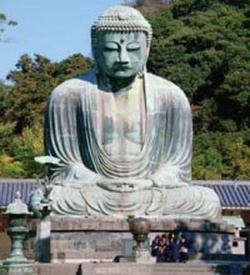Nembutsu Chosen above All
Nembutsu Chosen above All, The
選択集 (Jpn Senchaku-shu or Sen-jaku-shu )
A work written in 1198 by Honen, the founder of the Pure Land (Jodo) school in Japan. Its full title is The Nembutsu of the Original Vow Chosen above All.
This work advocates the practice called Nembutsu above all other ways of achieving rebirth in the Pure Land.
Nembutsu, literally, "meditation on a Buddha," is interpreted to mean invoking the name of a Buddha, especially that of Amida Buddha, i.e., reciting the invocation Namu Amida Butsu ("Homage to Amida Buddha").
In The Nembutsu Chosen above All, Honen explains the doctrine behind this practice, citing passages chiefly from the three Pure Land sutras and Shan-tao's [[Commentary on the [Meditation on the Buddha Infinite Life Sutra]].
Following Shan-tao, a patriarch of the Chinese Pure Land school, he divides Buddhist teachings into the Sacred Way teachings and the Pure Land teachings, the difficult-to-practice way and the easy-to-practice way, and correct practices and sundry practices.
He identifies the Nembutsu doctrine alone as the Pure Land teaching, the easy-to-practice way, and the correct practice.
He enjoins people to "discard, close, ignore, and abandon" (as Nichiren later summarized Honen's terminology) all Buddhist teachings other than the three Pure Land sutras and all Buddhist practices other than that of calling upon the name of Amida Buddha in order to be reborn in Amida's Pure Land.
Nichiren strongly criticized the content of The Nembutsu Chosen above All in his work of 1259, On the Protection of the Nation, and other writings as being destructive to Buddhism and thus to the people's welfare.
